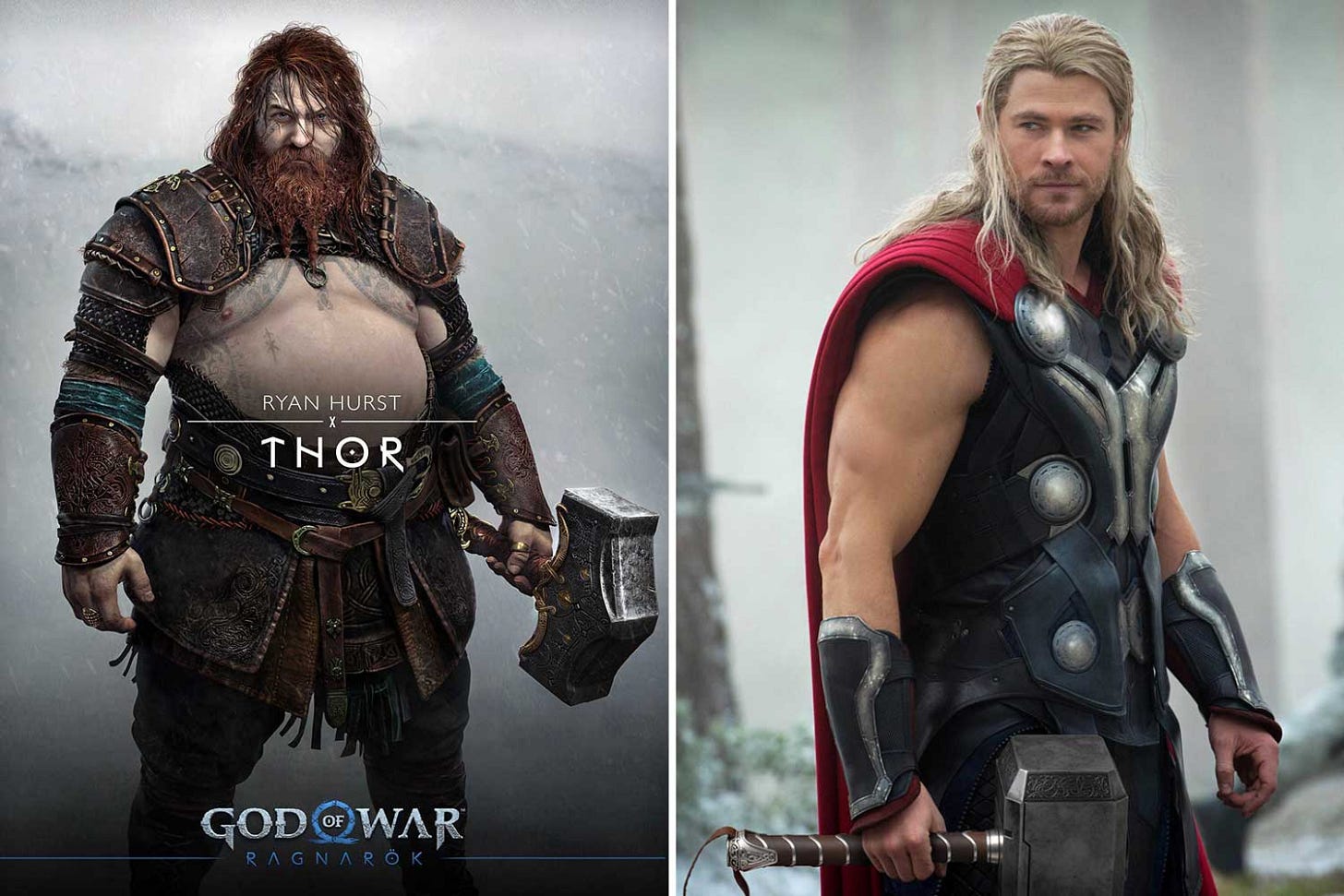Dad Bods, Adonis Complex, and the Real Reason to Train
Redefining Strength: Navigating the Complexities of Male Body Image in Modern Society
The Complexities of Male Body Image
Male body image is a multifaceted issue shaped by societal pressures, personal insecurities, and cultural standards.
Men are often pushed to avoid being too skinny, too fat, or even too muscular—expectations that vary widely depending on who you ask. These ideals influence not only how men view themselves but also their physical and mental health.
The Gym: A Double-Edged Sword
Many men turn to the gym to improve their appearance, hoping to boost confidence and attract attention.
I was no different—I wanted to look better naked and catch women’s eyes. At my peak fitness, I noticed women looking at me more often, but paradoxically, it didn’t lead to more romantic opportunities.
Instead, I attracted men who were curious about my diet and training regimen. Gay men, being more direct than most women, approached me with compliments about my physique. While I occasionally overheard women discussing my arms or glutes, none made the first move, and even those I approached often ghosted me.
Hollywood had misled me. I had trained hard after watching too many films that showed muscular men instantly catching women's attention—scenes that usually ended with the female lead pursuing these chiseled characters.
Hollywood's Influence on Male Body Ideals
This disconnect highlights a surprising truth: building a muscular physique doesn’t guarantee the outcomes many men anticipate.
While physical fitness can enhance confidence, societal preferences for the “perfect body” have shifted, adding complexity to how men interpret their own attractiveness.
The male body is objectified, primarily by men themselves. Hollywood has deemed that male bodies must be Adonis-like. Marvel superheroes like Thor, played by Chris Hemsworth, were depicted as muscular, god-like figures.
In Avengers: Endgame, Thor—feeling defeated—loses his luster for life. He becomes a shut-in, gaining significant weight around his midsection. Hollywood portrayed these changes through stereotypical "rock bottom" behaviors: heavy drinking, belching, and endless video gaming. His appearance deteriorated—unwashed hair, soiled clothes, and poor hygiene. These depictions painted him as society's version of a "disgusting and lazy" anti-hero.
Ironically, the Thor of Norse mythology more closely resembles this out-of-shape version: a man with long, unkempt hair, a thick beard full of debris, a large belly, and a barbaric character.
There was even upheaval when Santa Monica Studios released their God of War Ragnarök trailer. Fans compared Thor's appearance in the game (which more closely depicts the true Norse character) to Hemsworth's Avengers Thor. As seen in this article by The Sun, the Thor body depiction sparked heated debates across Reddit..
God of War’s Thor incenses gamers as they compare him to rip…
Another comic book character that Hollywood has depicted as a muscular, lean fighting machine is Wolverine. In the early comics, while Wolverine was fit, he wasn't lean—he had muscle definition, but his muscles didn't ripple. Hugh Jackman famously portrayed the character in the original X-Men movies. In the earlier films, his physique was closer to the comic book version.
Over time, Jackman’s portrayal shifted from the more comic-accurate "dad bod"—a man who isn't shredded but isn't obese either— toward an ultra-lean, shredded physique, achieved through grueling, unsustainable training. This transformation, while impressive, reinforces the notion that only extremes are valued, a message detrimental to men’s self-esteem and mental health.
Research Into Body Image
While Hollywood shapes perceptions, research reveals the broader implications of societal pressures on male body image.
Studies show that men often link body dissatisfaction to a drive for muscularity rather than thinness. Unlike women, whose body appreciation tends to increase with age, men’s body satisfaction remains relatively stable and lower across their lifespan.
Men also experience unique challenges in addressing body image issues. Social norms discourage open discussions about insecurities, perpetuating cycles of self-doubt and unhealthy behaviors. Poor body image correlates with low self-esteem, emotional withdrawal, and strained relationships, particularly in intimacy. This struggle is further exacerbated by rising obesity rates and unrealistic media portrayals.
Despite these challenges, there are few resources dedicated to helping men develop healthier relationships with their bodies. Addressing this gap requires holistic programs that integrate psychological support, fitness strategies, and societal awareness.
The Female Gaze: A Softer Perspective
Interestingly, many women value qualities beyond a man’s physical appearance.
Interviews reveal that while women may admire muscular physiques, they often prefer a softer build, such as the “dad bod,” which feels more approachable and comforting.
Women cite reasons ranging from physical comfort during intimacy to emotional accessibility. Some even express hesitance to date men in peak physical condition, fearing intimidation or competition. This nuanced perspective suggests that men need not chase extremes to be attractive; instead, a balanced approach to health and fitness can be more appealing.
Physical Training: Beyond Aesthetics
The benefits of physical fitness extend far beyond appearance.
Training your body signals discipline, resilience, and self-respect—qualities that resonate deeply with personal growth and long-term health. While societal ideals often prioritize aesthetics, true fitness is about building strength, both physical and mental.
Research highlights the impact of physical activity on mental health. Regular exercise reduces symptoms of depression and anxiety, enhances mood, and improves cognitive function. It promotes neuroplasticity, strengthens self-regulation skills, and fosters a positive cycle of mental and physical well-being.
Importantly, physical fitness should be sustainable. Extreme measures, such as performance-enhancing substances or obsessive training, undermine long-term health and mental stability. A balanced approach, combining aerobic and resistance training, yields the best results.
The Role of Muscle Mass in Longevity and Cognitive Health
Recent studies underscore the importance of muscle mass as a predictor of longevity and cognitive function.
Higher muscle mass correlates with lower mortality rates and improved brain health, including better memory, decision-making, and focus. Strength training enhances the release of brain-supportive chemicals like brain-derived neurotrophic factor (BDNF), reinforcing the mind-body connection.
For men, this evidence reframes the narrative: fitness should prioritize functionality and resilience over superficial aesthetics. Building muscle not only improves physical health but also protects cognitive abilities, making it a critical investment in long-term well-being.
Actionable Steps Toward Sustainable Fitness
Find Joy in Movement: Explore different types of exercise—calisthenics, weightlifting, or kettlebell training—and find what you enjoy most.
Set Realistic Goals: Aim for 150 minutes of moderate-intensity exercise per week, gradually incorporating vigorous activities.
Mix It Up: Combine aerobic exercises like swimming with resistance training to engage different muscle groups and avoid burnout.
Focus on Consistency: Create a routine by scheduling workouts at regular times and tracking progress to stay motivated. Journaling and apps can help you in this area. Having a consistency partner will keep you accountable.
Prioritize Balance: Embrace a sustainable approach to fitness that values health over extremes.
Conclusion
What does this mean for you?
Training your body is about much more than looking good or meeting societal expectations. It's about building a foundation that equips you to handle life's physical and mental demands with strength and resilience. Developing muscle not only protects your brain from cognitive decline as you age but also enhances your mental clarity, emotional stability, and adaptability.
Every workout is an investment—not just in aesthetics, but in how you think, feel, and navigate life's complexities. Train for longevity, mental sharpness, and personal growth. Let your commitment to fitness reflect a mindset of discipline and self-respect, not simply a desire to impress. When paired with a balanced diet and sustainable practices, your physical attributes will naturally align with your inner strength and confidence.
While society often idolizes the Adonis-like physique seen in Hollywood, it's crucial to separate health from unattainable ideals. Pursuing a lean, muscular body through sustainable practices—like clean eating and consistent training—can be rewarding. However, obsessively chasing the "perfect" body through extreme methods or performance-enhancing substances undermines your mental and physical well-being. True fitness is not about conforming to a comic book depiction but about cultivating a body and mind that thrive in the real world.
Ultimately, redefine what fitness means to you. Make it about more than appearance—let it be a tool for achieving balance, health, and a deeper connection to your own potential.
Studies used in this essay
Body Image, Weight, and Self-Concept in Men
Link: PMC Article
Muscle Mass Index as a Predictor of Longevity in Older-Adults
Link: PMC Article
Skeletal Muscle Mass as a Mortality Predictor among Nonagenarians and Centenarians: A Prospective Cohort Study
Link: Nature Article
Size or Strength? how components of muscle relate to behavioral and neuroelectric measures of executive function independent of aerobic fitness
Link: ScienceDirect Article
Physical activity levels affect mental health and behavior in men
Relationship between different domains of physical activity and positive mental health among young adult men
****Link: BMC Public Health Article
Body Dissatisfaction, Importance of Appearance, and Body Appreciation in Men and Women Over the Lifespan
Link: PMC Article










Adam, I like how you captured the absurdity of chasing a Hollywood ideal i.e. building a body that attracts more compliments from men than dates with women. Better yet, you wrapped that paradox in humor, makes it relatable and entertaining. Love this!